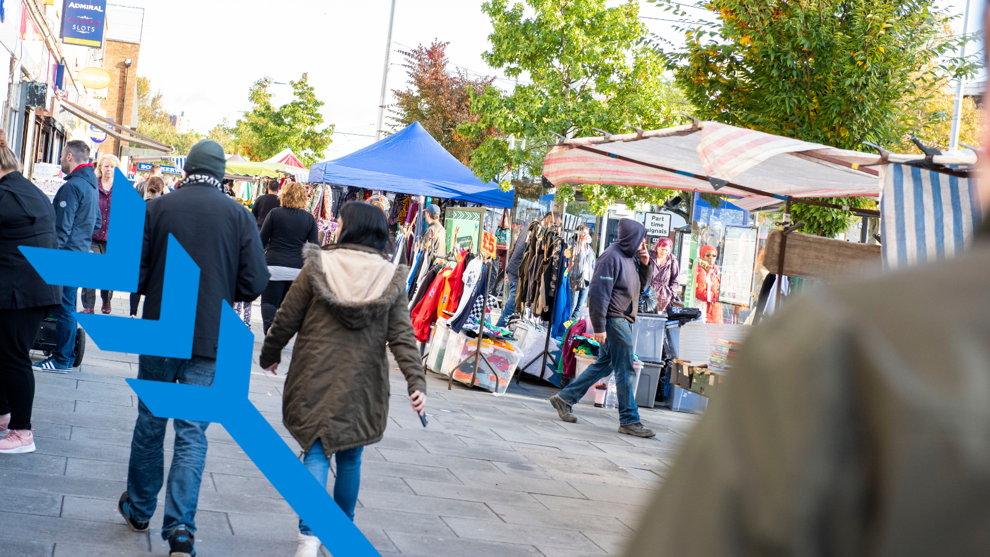Stuff
Around half of our carbon emissions come from the things we buy and consume
 Why it matters
Why it matters
All of the stuff we buy adds to our carbon footprint. This includes everything from appliances, lightbulbs, phones and computers to tyres, clothing, food, and other household essentials. This also includes our leisure activities such as going on holiday.
As well as the things we buy, services from deliveries of things we’ve purchased online to banking also contribute to our carbon footprints.
Our consumption of the planet’s resources is threatening the wellbeing of future generations and the limited natural resources we depend upon.
This is not just about changing our diets and our behaviours towards consumption. If we buy less stuff, buy higher-quality products and keep them longer, we can reduce the amount we consume.
Food and drink
Food accounts for a massive 25% of the world’s carbon dioxide emissions. Lots of things make up the emissions from food and drink, including growing or producing it, transporting it to us, and disposing of it if it’s not eaten.
More than half of the emissions from food come from animal-based products, especially beef and dairy. Beef farming is also one of the top reasons for deforestation.
Increasing the amount of plant-based meals you eat is one of the easiest ways to reduce your carbon footprint – and it can be better for your health too.
We want to make food in Nottingham more sustainable by increasing local food production, reducing how far food travels before it reaches us, and making sure everyone has tasty and nutritious meals to eat.
Clothes
In the UK, over 3.5 billion items of clothing are bought each year. It is estimated that the amount of clothes purchased each year will continue to grow, reaching over 4.3 billion in 2026.
As well as having a huge carbon footprint, microplastics are released by washing clothes. This is a problem for our planet’s oceans, as the equivalent of 50 billion plastic bottles end up in the ocean because of clothing.
Much of the clothing we buy ends up in the bin, where it goes to landfill or is incinerated. As clothes can contain organic material (cotton or wool), this breaks down after it’s thrown away and produces greenhouse gases such as methane.
What we’re doing
We are developing a sustainable food strategy for Nottingham and using local suppliers to reduce food miles and reducing food waste in school kitchens. We've launched a national pilot project with FareShare and Sainsbury’s to turn food surplus into meals for vulnerable residents through the Loxley House kitchen facility. So far, more than eight tonnes of surplus food has been made into 19,500 meals for those in need!
We are increasing the proportion of meals served in our schools to be plant-based and looking to increase the choice for plant-based food in our other council facilities.
Food provided through the internal catering service is plant based and staff encouraged to try milk alternatives at the coffee bar at Loxley House.

What can you do?
❓ Stop and think about new purchases
When considering a new purchase, first think: Do I need it? Will I use it? Is there a more sustainable option?
🧆 Reduce your meat and dairy consumption
Livestock farming emissions account for 7% of all global Greenhouse Gas emissions. Eating more plant based meals is not only better for the environment, but is better for our health, as high meat consumption is linked with a number of dietary related diseases. Meat Free Monday can give you loads of helpful advice to get started with plant based meals. Find out more on their website: Home - Meat Free Monday (meatfreemondays.com)
👕 Buy clothing or furniture second hand
There are loads of websites that will help you buy and sell your used items, from clothes to electricals, household items to stuff for your pets. You can often find items in new or nearly new condition at big savings - and nobody will ever know you bought it second hand, unless you want them to!
Find a new home for unwanted items by offering them to others in your community. You can swap things you don't need or are looking for at websites such as Freecycle or Freegle
🛠 Repair and reuse
Don't necessarily give up on your stuff when it's looking past it's best, sometimes it's possible to breath live into things we've previously neglected or worn out. Clothes that are looking a bit tired can often be made good as new with a DIY re-dye or some stylish visible mending. New furniture can get an edgy update with new upholstery, replacing handles or a re-paint. You can often pick up second hand furniture really cheaply from auctions of charity shops.
For more complex fixes, you might be able to get an expert to help you for free at a local Fixers Repair Café
🥕 Eat seasonal
Food that's not in season locally is imported from abroad, and sometimes that means travelling enormous distances by air, such as Blueberries from as far away as Chile that are sold year round in UK supermarkets. Buying foods that are in season means they can come from local sources and save a lot of transport carbon emissions. The Eat Seasonably website will show you what's in season and when in the UK: Eat Seasonably
📅 Create a food plan
Planning ahead and paying attention to use by dates will help prevent food being forgotten and wasted. When you have some down-time, plan in tasty meals to look forward to all week - and if you want to be super organised, batch cook in advance to enjoy less prep time later!
